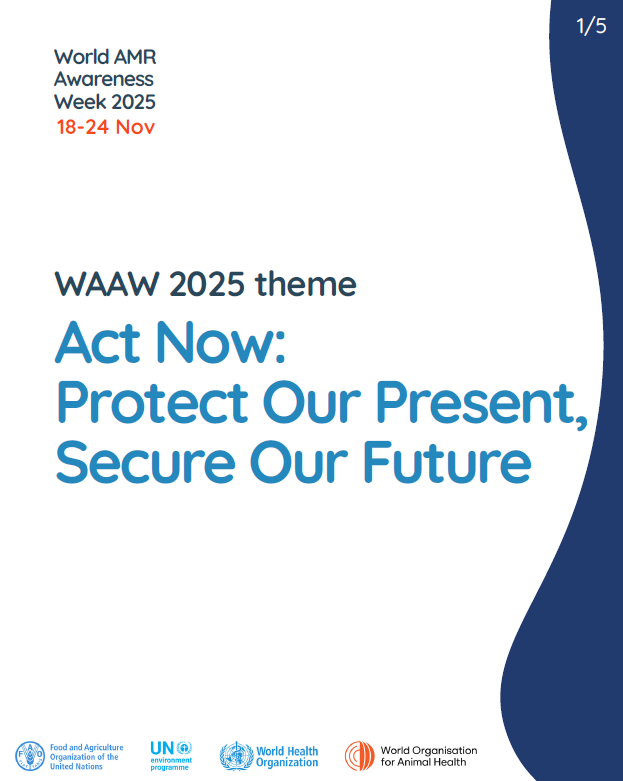
World AMR Awareness Week
About
World AMR Awareness Week (WAAW) - formerly World Antimicrobial Awareness Week - is an annual global campaign to improve awareness and understanding of antimicrobial resistance (AMR). This week also aims to encourage best practices among the public, healthcare workers, animal health professionals, environmentalists, farmers, policymakers, the youth, civil society and media, who play a critical role in reducing the further emergence and spread of drug-resistant pathogens. Over the week, activities including high-level events, global youth summits, technical webinars, panel discussions, and many other celebrations are organized around the world.
WAAW is commemorated every year from 18 to 24 November.
World AMR Awareness Week (WAAW) 2025 Theme
“Act Now: Protect Our Present, Secure Our Future”
The AMR Quadripartite organizations - the Food and Agriculture Organization of the United Nations (FAO), the United Nations Environment Programme (UNEP), the World Health Organization (WHO), and the World Organisation for Animal Health (WOAH) are pleased to announce that the theme of World AMR Awareness Week (WAAW) 2025 will be “Act Now: Protect Our Present, Secure Our Future”.
The theme underscores the urgent need for bold, coordinated, cross-sectoral action to address AMR, a growing global threat that is already affecting our health, food systems, environment and economies. AMR is not a distant challenge; it is a present danger that demands immediate, sustained action. Drug-resistant infections are increasing, yet awareness, financing, investment and action remain insufficient.
Building on the momentum of the 2024 United Nations General Assembly High-level Meeting on AMR, this call to action urges all stakeholders, including governments, civil society, health-care providers, veterinarians, farmers, environmental actors and the public to translate the political commitments into tangible, accountable, life-saving interventions. To protect our present and secure our future, we must prioritize long-term investment and strategic action in the human, animal and environmental health sectors. Strengthening surveillance, ensuring equitable access to quality medicines and diagnostics, fostering innovation and building resilient systems all require long-term commitment and resources.
Investment in AMR action is smart. It is an essential step toward a healthier, more secure future. Whether it is a hospital administrator establishing an antimicrobial stewardship team or a farmer adopting sustainable waste management practices, every action counts. No matter your role – whether shaping policy, delivering care, protecting ecosystems or raising awareness, “Act Now: Protect Our Present, Secure Our Future” is a shared responsibility. Together, we can preserve the effectiveness of antimicrobials and ensure a healthier, more sustainable world for the generations to come.
WAAW 2025 theme in six languages:
- Arabic: تحرك الآن: من أجل حماية حاضرنا وتأمين مستقبلنا.
- Chinese: 立即行动:守护当下,保障未来。
- English: Act Now: Protect Our Present, Secure Our Future.
- French : Agissons maintenant : protégeons notre présent, sécurisons notre avenir.
- Russian: Время действовать: защитим настоящее, проявим заботу о будущем.
- Spanish: Actuemos ya: protejamos nuestro presente, aseguremos nuestro futuro.
A brief description of the theme is available in six languages here.
World AMR Awareness Week 2025 - Campaign Guide
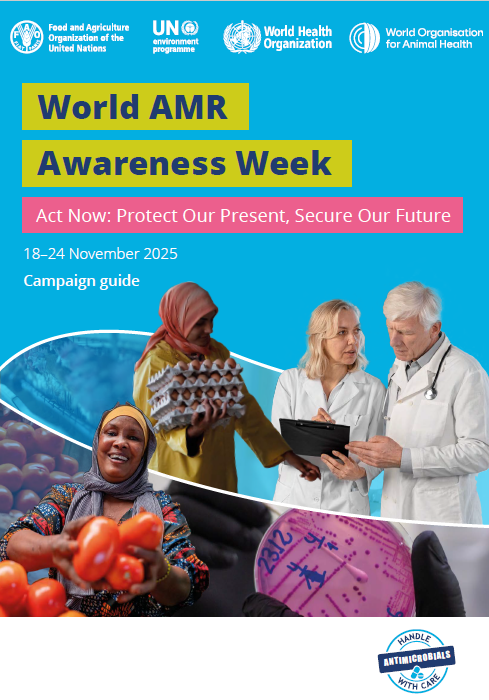
Get involved in WAAW 2025: The Food and Agriculture Organization of the United Nations (FAO), the United Nations Environment Programme (UNEP), the World Health Organization (WHO) and the World Organisation for Animal Health (WOAH), collectively known as the Quadripartite, have jointly developed a campaign guide to support and guide this year’s WAAW. The guide provides key information and practical ideas to help you take part in the global commemoration of WAAW 2025. It includes the campaign theme, guidance on how to participate and social media information. It also provides links to the WAAW pages of the Quadripartite organizations and direct access to multilingual communication materials and resources.
We hope this guide will inspire you to develop your own, local activities to raise awareness about AMR and its impact on our world. Your engagement is vital to the success of this global campaign.
Download the campaign guide below
Logo Stamps
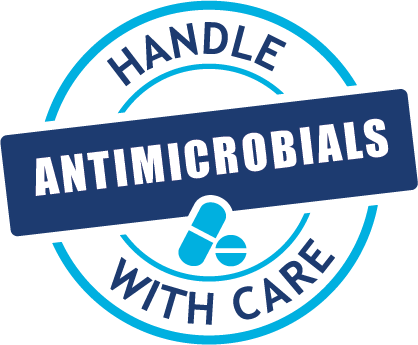
Download the logo stamps
English - French - Spanish - Arabic - Russian
Portuguese - ZH - Vietnamese - Thai - Swahili
Khmer - Bangla - Hindi - Indonesian - Lao
Key Messages
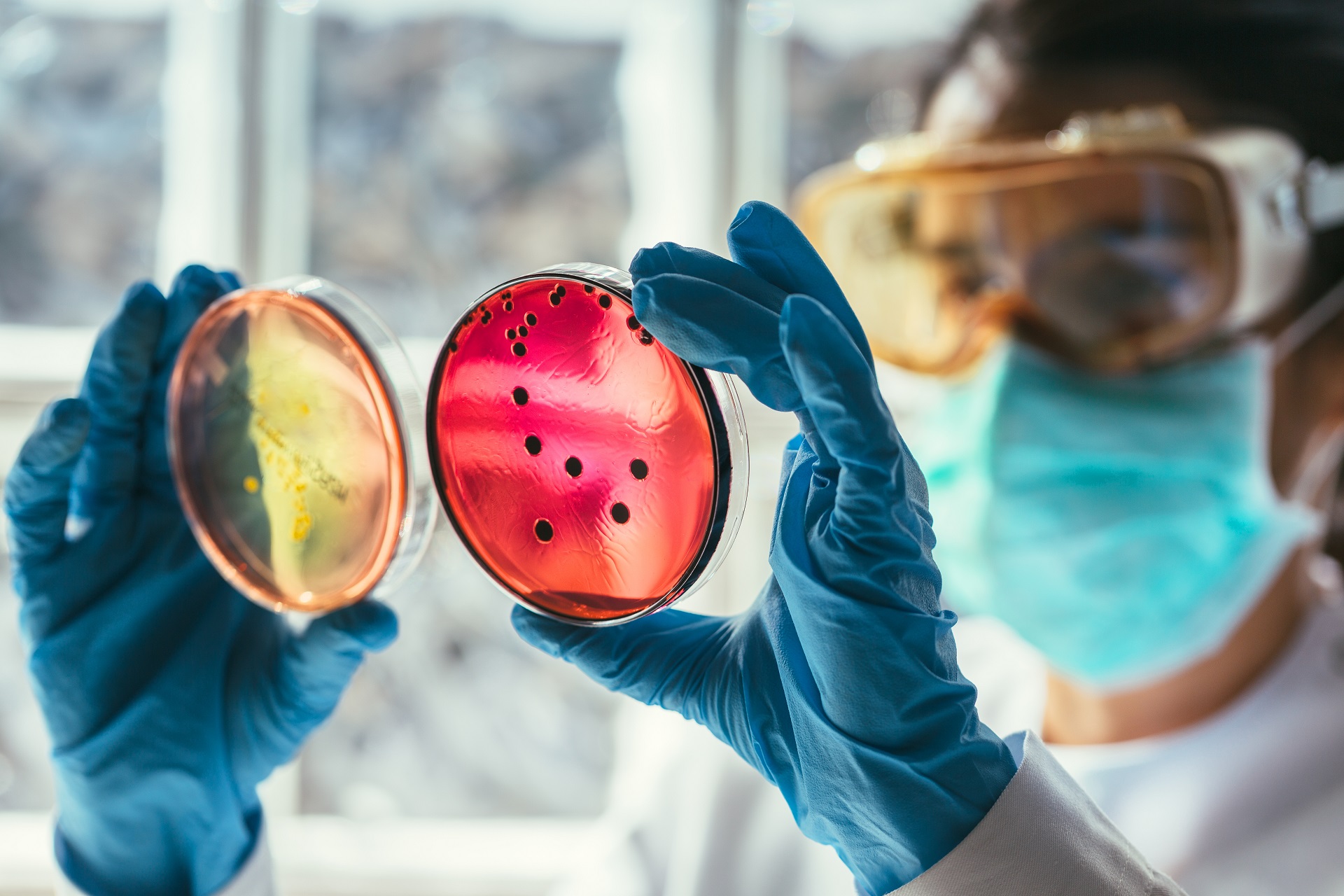
-
Antimicrobial Resistance (AMR) occurs when bacteria, viruses, fungi and parasites no longer respond to antimicrobial agents. As a result of drug resistance, antibiotics and other antimicrobial agents become ineffective and infections become difficult or impossible to treat, increasing the risk of disease spread, severe illness and death.
-
Antimicrobials are agents used to prevent, control and treat infectious diseases in humans, animals and plants. They include antibiotics, fungicides, antiviral agents and parasiticides. Disinfectants, antiseptics, other pharmaceuticals and natural products may also have antimicrobial properties.
-
AMR occurs when bacteria, viruses, fungi and parasites no longer respond to antimicrobial agents. As a result of drug resistance, antibiotics and other antimicrobial agents become ineffective and infections become difficult or impossible to treat, increasing the risk of disease spread, severe illness and death.
-
AMR is happening here and now. It is one of the biggest threats to global health, food security, environment and sustainable development today.
-
Misuse and overuse of antimicrobials in humans, animals, plants and environment are accelerating the development and spread of AMR worldwide.
-
The challenges of AMR are complex and multifaceted, but they are not insurmountable. A One Health response to AMR will help save millions of lives, preserve antimicrobials for generations and secure the future from drug-resistant pathogens.
Did you know?
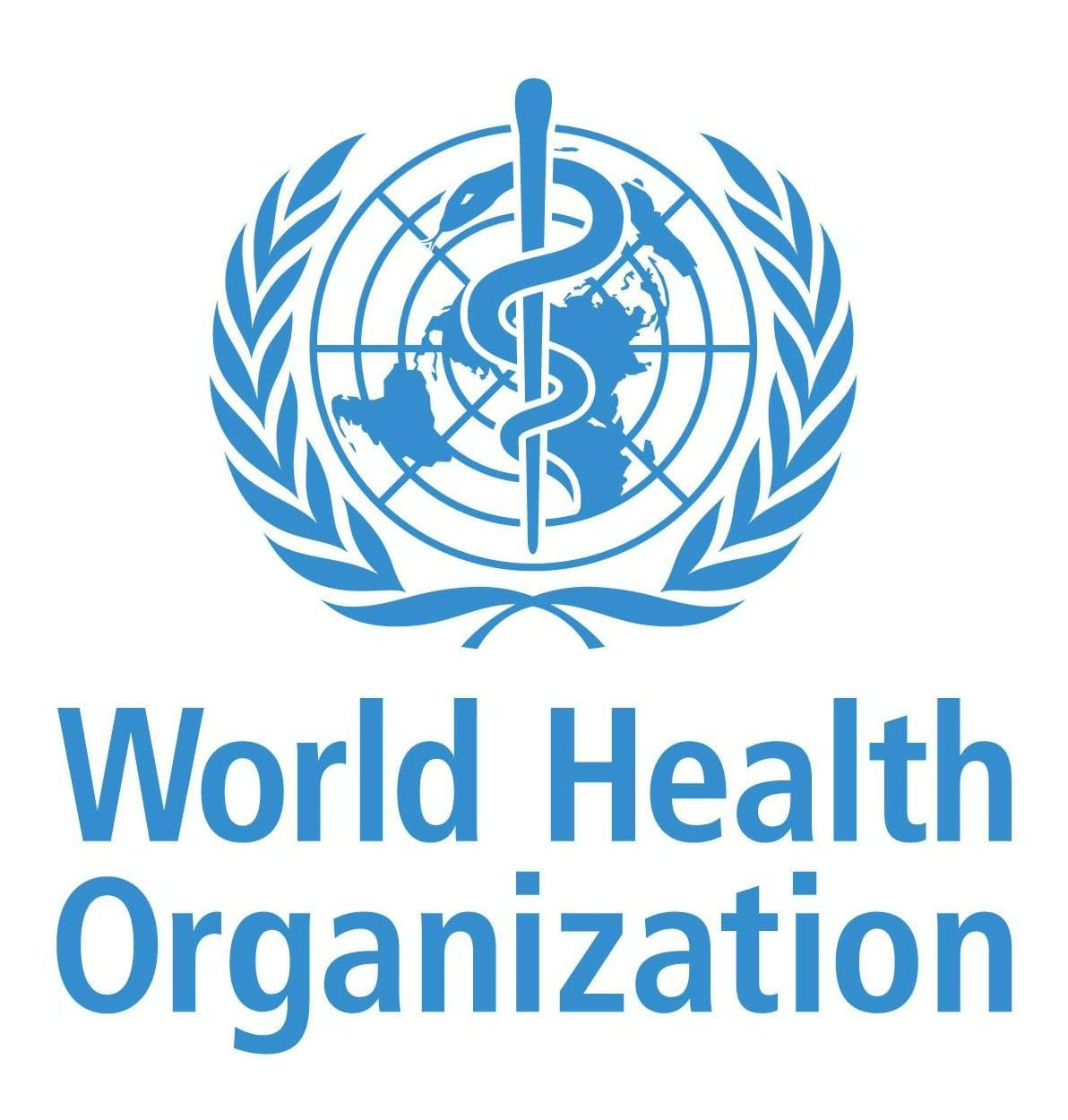.png?sfvrsn=618163bd_1)
-
In 2019, nearly 5 million human deaths worldwide were associated with bacterial AMR, of which 1.3 million human deaths were directly attributable to bacterial AMR. -
The development of a new antibiotic can take 10-15 years and cost more than USD 1 billion.
-
Releases from unused drugs disposed of in toilets, bins or waste dumps contribute to exacerbating AMR.
-
Keeping animals healthy is an important measure to reduce the need for antimicrobial treatment in the first place.
-
In a high-impact scenario, AMR will reduce global annual GDP by 3.8 percent by 2050. Left unchecked, in the next decade, AMR could result in a GDP shortfall of US$ 3.4 trillion annually and push 24 million more people into extreme poverty.
-
When preparing food, washing hands before cooking and keeping food preparation areas clean can help prevent the spread of drug-resistant microbes.
-
Human-induced pollution exacerbates AMR in the environment. The treatment of waste streams of municipal, agricultural, and industrial origin are important preventive measures.
-
Access to safe water, sanitation and hygiene (WASH) in homes and health facilities can reduce the need for antibiotics to treat diarrhoea by up to 60 percent. WASH helps prevent drug-resistant infections, saves lives and reduces health care costs.

